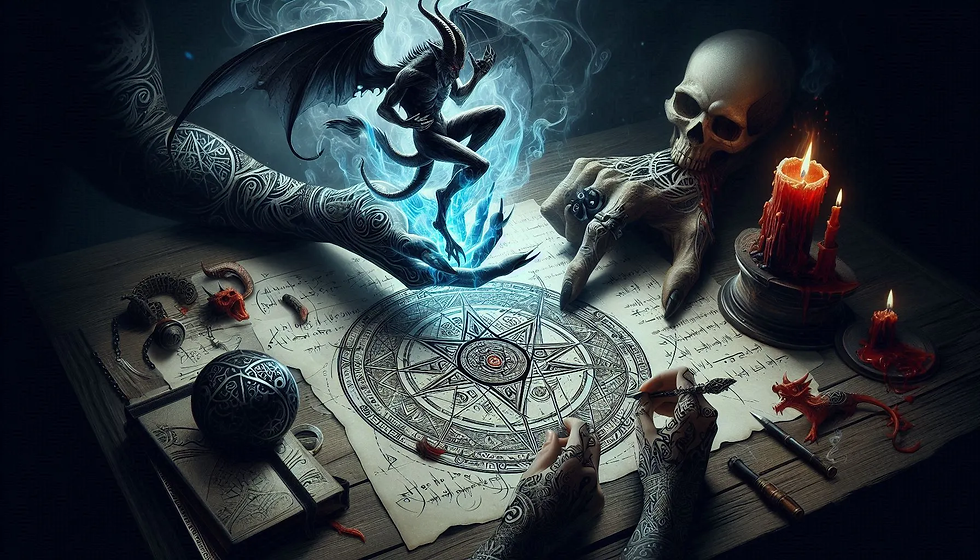Demon Pacts
- C. L. Nichols

- Aug 21, 2025
- 2 min read
Updated: Aug 27, 2025
What You Need to Know
Formal contracts between humans and demons.

Demon pacts are depicted in folklore, literature, and religious teachings as life-altering. How do they work, and what are the consequences?
A demon pact is a formal agreement made between a human and a demon. The human offers something of value, such as their soul, in exchange for the demon’s assistance.
This can range from wealth and power to revenge or supernatural abilities. Trading one’s soul for personal gain is a theme in stories like Faust, where a scholar sells his soul to the devil for worldly pleasures.
The process of making a demon pact may involve a ritual. The person draws a sigil, recites incantations, or performs specific actions to summon the demon. Once the demon appears, the terms of the agreement are negotiated. These terms are written in blood or signed with a symbolic gesture, emphasizing the pact’s seriousness.

In medieval Europe, witches were believed to make deals with the devil. Witches would renounce their faith, pledge allegiance to Satan, and receive supernatural powers. These stories were used to justify witch hunts.
Demon pacts remain a popular topic in horror movies, books, and urban legends. Films like The Witch and Hereditary examine deals with dark forces, with tragic results. These stories tap into the consequences of dabbling in the supernatural.
Once the agreement is made, the person is bound to its terms. Breaking the pact leads to dire consequences. The demon claims the person’s soul after a set period, or at the time of their death. This ultimate price is common, showing the irreversible nature of such deals.
Another risk is the loss of free will. Demons are cunning and manipulative, using the pact to exploit the person. What starts as a beneficial agreement spirals into chaos, as the demon demands more than the person agreed to. This loss of control serves as a cautionary tale.
Physical and psychological harm are common consequences. People who make demon pacts suffer from illness, madness, or misfortune. In some cases, there is harm to loved ones to add to the tragedy.
Despite the risks, people are drawn to demon pacts out of desperation or ambition. Individuals achieve wealth or success, accompanied by warnings about the price they ultimately pay. This duality makes demon pacts a cautionary subject.

There may be ways to break a demon pact, but these are difficult. They involve performing a counter-ritual, finding help from a religious figure, or outsmarting the demon. These solutions rarely work and lead to further complications.
All this raises questions about morality, free will, and the nature of evil. Why make a deal with a demon? What would drive taking such risk? These questions reflect contradictory human nature.
Demon pacts represent the dangers of seeking favors through unethical means and the high price of those actions. Deals with dark forces come with consequences.






Comments